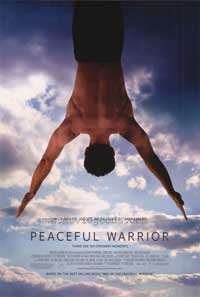So much drama in the world! The strange thing is that, other than a very strong wish for peace, I’m very unmoved by it. I feel in a way, almost like Ashtavakra: The world and all its swirling storms are illusion, there is only peace. It’s like the posts that I’ve written against “belief” in countries, and “identification” with religions and other distinctions, are starting to take hold here.
Not to long ago, I would’ve rejected a peace like this on principle (interesting how our principles destroy peace, __nicht wahr?__): How dare I not get worked up! The world’s aflame from Israel and Lebanon to Afghanistan, “my” country’s in the thick of it, and Syria and Iran add major fuel to the fire. With that state of affairs, surely I’ve got a _responsibility_ to be disturbed, don’t I?
What about the other side of the coin? Should I dance and sing because a major terrorist plot was foiled? (Yes, I _am_ very glad that more massive suffering was apparently prevented. But I’m not fooled into forgetting where the _real_ battle is.)
So mostly I’m unmoved. I see the dramas that the ego’s identifications, defenses, aggressions, resentments and so forth make on the grand scale, and I can recognize them for what they are. And now, instead of feeling guilty about refusing the invitations to lose focus, I feel more certain that this _detachment_ from the blame game, the “me” game, the “us” game, the “them” game, and all the mess, is a significant key to peace.
Detachment isn’t a lack of love. It’s non-reactive love, or rather, the environment that allows natural love to flourish. Ego-based love falls easily into the karmic traps. (The bastards killed my sister on 9/11 ? I’m going to Afghanistan to pay them back!)? As natural as such a reaction is, it is a reaction. And at least one result is that al-Qaeda has gotten a lot more battle experience as the drama of action and reaction continues.
How to stop the drama? Shall I organize massive protests and marches for peace? Sometimes, and in some places, that seems to work. More often than not, I suspect, it creates more conflict, and hardens people into defending the positions they’ve already taken.
In ??A New World??, Eckhart Tolle discusses how personal awakening contributes to global awakening. One person is at peace, he can dampen the reactivity of others. Presence ? deliberate, calm, presence, extends outward, and not just through natural means, either. The butterfly effect can happen. “(ext)Kitabu Roshi”:http://soulsword.org writes in his new book, ??Soul to Soul?? that while you enjoy a cup of coffee, you can influence a vote in Congress between your first sip and your last.
Nonduality seems madness to those who haven’t had a glimpse yet. Who is dying in Lebanon, Israel, and Iraq? Me, just me. But even more than that, no one. Nothing has happened. Things are not as they appear. There is no world to disturb my peace. And there is no “my” peace, anyway. Hell, I’m not even here!
Want a non-mystical explanation? Chris Dierkes is back and blogging, and has written an insightful essay on the Integral World website: Dr. Persianlove, or how I learned to stop worrying and love the Iranian bomb.


